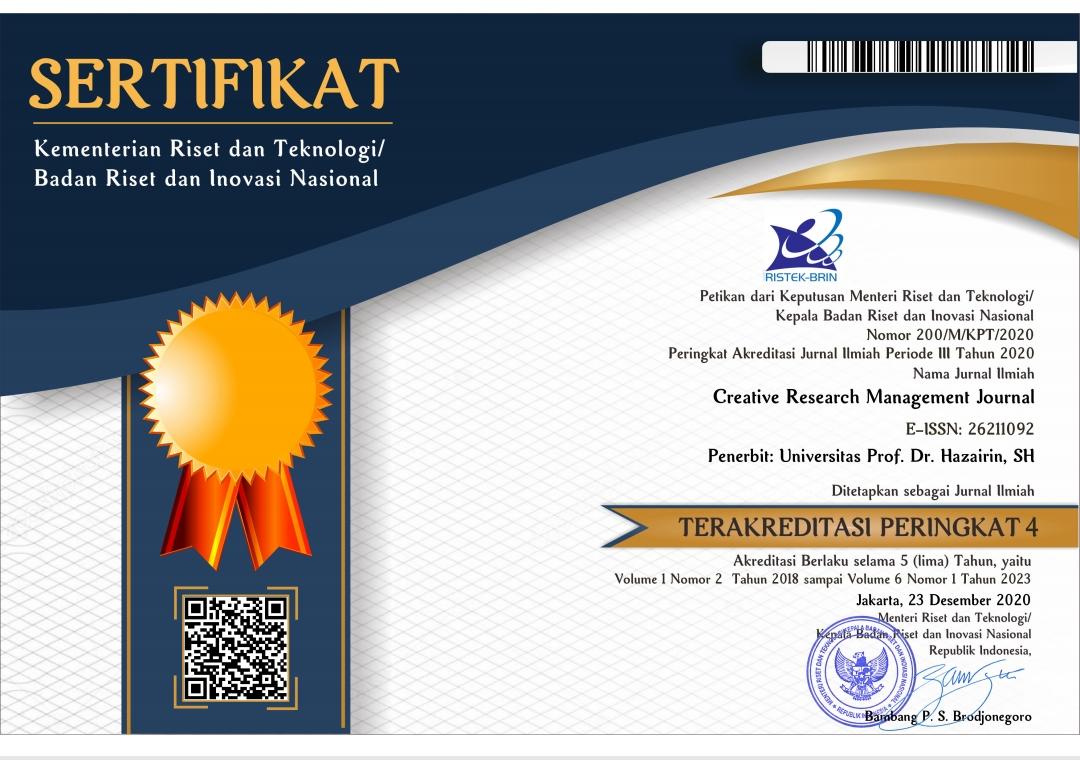ANALISIS SOFT SKILL DAN HARD SKILL SERTA PENGARUHNYA TERHADAP OPTIMISME CALON LULUSAN PRODI MANAJEMEN UNIHAZ BENGKULU
DOI:
https://doi.org/10.32663/crmj.v3i1.1280Keywords:
Soft Skill, Hard Skill, Optimism of Prospective GraduatesAbstract
This research is explanatory research, intended to determine the relationship between soft skill and hard skill variables on the optimism of prospective graduates of Bengkulu Unihaz Management Study Program. The quantitative data of this study were obtained from questionnaires which were then processed into statistical analysis. The results of the analysis are known soft skill variables (X1) and hard skills (X2) have a strong and unidirectional relationship, and have a positive effect on the optimism variable of prospective graduates of the Unihaz Bengkulu study program. This is evidenced by the value of multiple correlation, multiple linear regression, t-test and f-test. Of the two independent variables hard skill contribution is greater than the soft skill. As a suggestion to improve students' hard skills and soft skills, they encourage them to be more active in research and community service, carry out excursion studies, namely visiting companies, entrepreneurs, crafts and other institutions that can foster their hard skills and soft skills, then directed to be more active in student organizations, youth and spirituality.
References
Carver, C.S., Scheier, M.F., & Segerstrom, S.C. (2010). Optimism. Clinical Psychology Review, 30, 879-889.
Elfindri dkk. 2010. Soft Skill Untuk Tenaga Pendidik. Jakarta: Baduose Media.
Fauzan. 2019. Pengaruh Soft Skill dan Locus of Control Internal Terhadap Kesiapan fresh Graduate Dalam Era Industri 4.0 (Studi Pada Prodi Manajemen Unihaz Bengkulu. Jurnal CRMJ ISSN 2621-1092. Vol 2 Nomor 2. Fakultas Ekonomi Prodi Manajemen UNIHAZ Bengkulu
Ghufron, M. N.& Risnawita, S. R. (2011). Teori - teori psikologi. Yogyakarta: Ar-ruz Media Group.
Mahasneh, J., & Thabet, W. (2015). Rethinking Construction Curriculum: A Descriptive Cause Analysis for Soft Skills Gap. ASC Annual International Conference Proceedings, 1-8.
Muqowim (2012) Pengembangan Soft Skill Guru. Yogyakarta: Pedagogia.
Priyatno. (2013). Mandiri Belajar Analisis Data Dengan SPSS. Jakarta, Mediakom.
Robles. (2012). Executive perceptions of the top 10 soft skills needed in today’s workplace. Business Communication Quarterly, 75, 453-465.
Shivanjali. 2010. Softskills Training Versus Hard Skills Training. International Journal in Multidisciplinary and Academic Research (SSIJMAR),Vol. 1, No. 3, September-October (ISSN 2278 – 5973)
Smith, L. M. (2015). The relathionship between optimism and markers of psychological health in cologiate atheletes. University Nort Carolina.
Sri Suwarsi dan Agustin Handayani. (2017). Hubungan Antara Optimisme Dan Problem Focused Coping pada Mahasiswa Yang Sedang Menyusun Skripsi Proyeksi, Vol.12 (1) Fakultas Psikologi Universitas Islam Sultan Agung Semarang ISSN : 1907-8455.
Sugiyono, (2013), metodelogi penelitian bisnis, Bandung, CV Alfabeta.
Untung Manara, 2014. Hard Skills dan Soft Skills pada Bagian Sumber Daya Manusia di Organisasi Industri, Jurnal Psikoloi Tabularasa, Volume 9, No.1, April: 37-47 Fakultas Psikologi, Universitas Merdeka Malang.
Vyas, P., & Chauhan, G. S. (2013). The Preeminence Of Soft Skills: Need For Sustainable Employability. Journal of Social Science & Interdisciplinary Research, 2(5), 124-131.
Waskito, AM. (2013). The power of optimism: membangun harapan dan semangat umat berdasar Al Qur’an,sunnah,dan kehidupan orang shaleh. Jakarta: Pustaka Al kautsar.
Z.Rasid.,B.Tewal.,C.Kojo. (2018). Penaruh Hard Skill dan Sof Skill Terhadap Kinerja Karyawan Perum Damri Manado. Fakultas Ekonomi dan Bisnis, Jurusan Manajemen Universitas Sam Ratulangi Manado Jurnal EMBA Vol.6 No.2. ISSN 2303-1174














